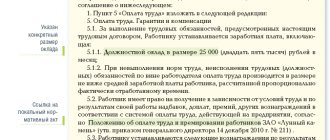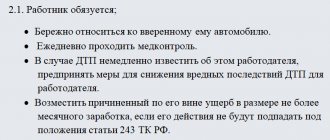Free legal consultation by phone:
8
The legislation of the Russian Federation does not prohibit the employment of disabled people of any group. In addition, the content of the Labor Code of the Russian Federation establishes special rules according to which an incapacitated citizen can enter into a full-fledged work contract. First of all, a person who has some impairments or deviations needs to find a suitable job. It should be borne in mind that such a citizen cannot be limited in his search, and any refusal associated with a physical disability will be unlawful. There are a number of requirements that an employer can present to a citizen with physical disabilities. Only on the basis of their absence can a refusal of employment be received:
- The future employee must provide a certificate from a doctor confirming his physical disabilities;
- Present a document outlining the person’s individual rehabilitation program.
Contents of the employment contract
The agreement is the main document establishing the relationship between the disabled person and the employer. Article 57 of the Labor Code of the Russian Federation regulates the main points, rights and obligations of both parties.
Contents include:
- company name;
- Full name of the disabled person;
- The position for which he is applying;
- schedule;
- conditions of vacation days;
- payment features;
- the rights and responsibilities of a disabled person hired for a position;
- responsibilities and rights of an organization that hires an employee with a disability;
- receiving compensation and guarantees in accordance with the Federal Law;
- liability of the parties in case of violation of clauses;
- validity periods;
- terms of termination.
Federal Law No. 181, Article 20, enshrines the right to full-time work. A disabled person cannot be refused employment. If this happens, then the employer’s actions are unlawful.
For parents of a disabled child
The presence of a disease in a child with the assignment of disability indicates that the parent caring for such a child does not have the opportunity to perform full-time work. Therefore, certain privileges are legally provided for such people.
When concluding a contract with the mother or father of a special child, management should adjust the clauses of the document taking into account the regulatory rules for organizing the work of these parents. These rules apply to those whose child’s condition allows them to work, and does not require constant presence with him, and apply only if there is documented medical confirmation of the descendant’s disability.
An important condition when concluding an agreement with the person-guardian of an unhealthy child is the approval of a part-time work shift or, in agreement with the contractor, an incomplete week with additional days off.
Features of an employment contract for disabled people of groups 1, 2, 3
Depending on the disability group, the document has features and nuances. In order to apply for a job, an employee with a restriction needs to prepare the following documents:
- passport;
- certificate confirming disability;
- work book;
- pensioner's ID;
- conclusion of a medical and social examination;
- individual rehabilitation program.
The contract must specify the employee’s working conditions, taking into account benefits approved by the state, in accordance with the group.
Benefits for the employer
Hiring of disabled people is carried out through allocated quotas. From 2 to 4%, depending on the volume of an enterprise with more than 100 employees, should be classified as citizens with medical certificates. The mechanism for providing jobs is established at the local level or subject of Russia.
For companies, hiring disabled people means reducing the tax base for the Unified Social Tax and income tax on the basis of clause 38, clause 1, article 264 of the Tax Code of the Russian Federation. Mandatory fees for the insurance component for injuries are also reduced.
To take such measures, labor costs for the less protected part of the population must be at least 25%, and the percentage of citizens employed in the organization must be more than 50%.
In order to receive benefits, disabled people working under a contract or part-time contract or on the basis of a civil law contract are not included in the staff.
When hiring disabled people, an enterprise can include the cost of remunerating such workers in accordance with clause 23 of Article 255 of the Tax Code of the Russian Federation for the amount of additional payments provided for in connection with special working conditions.
For example, an increase in the cost of work may be carried out in relation to employees who received physical disabilities while eliminating the consequences of the accident at the Chernobyl nuclear power plant.
To reduce the Unified Social Tax base for taxation, an organization must include:
- to public organizations, the total number of disabled people in which is more than 80%;
- companies with authorized capital formed from funds received from public organizations of disabled people, with a share of their earnings of 25% and if there are at least 50% of them on staff;
- organizations created for educational, medical, sports and other social purposes;
- unions to provide support to disabled children and parents when the property of the institution is owned by public unions of disabled people.
For these categories of organizations, exemption from the payment of unified social tax is carried out at the minimum annual salary of each employee, not only disabled people, from 100,000 rubles.
Payments provided to workers of disability groups 1, 2 and 3 are taken into account. It does not matter what type of contract, copyright, labor or civil law the payments are made under.
Benefits are not provided to companies engaged in the sale of mineral raw materials, mining, sale of goods with excise taxes, or other goods specified in Government Decree No. 884 of November 22, 2000.
Employment contract with a disabled employee of group 2
The employer is obliged to implement the benefits for people with disabilities that the government has legalized:
- Arrangement of the workplace in accordance with physical characteristics. For people of group 2 with disorders of the musculoskeletal system, the installation of a ramp is necessary.
- Build an individual work schedule if a disabled employee, due to weakness, cannot stand a full day. The number of hours is negotiated separately. Remuneration is paid in full, the amount of working time is not affected.
- Night shifts are assigned only if the employee approves of the decision. In case of refusal, coercion is criminally punishable.
- The responsibilities of a disabled person should not include business trips and other activities related to travel outside the company.
- It is prohibited to work overtime, as well as on weekends and holidays, without written consent (Article 96 of the Labor Code of the Russian Federation).
- According to Article 92 of the Labor Code of the Russian Federation: “The duration of the working week is no more than 35 hours.”
- Receiving a paid 30-day vacation with the possibility of an additional extension of 60 days, but at your own expense. The benefit gives you the right to plan your vacation regardless of your vacation schedule or time of year.
Disabled people of group 1 are considered incompetent and unable to carry out any work activity. In rare cases, it is possible to obtain partial legal capacity after concluding an ITU and apply for a job in a team.
An employer hiring such an employee must approach the registration process with all responsibility, so as not to infringe on the rights or harm the health of a disabled person. The document is drawn up the same as for citizens with the second group.
Design nuances
If the personnel officer knows that the applicant has a disability, you need to demand that he provide an IPR (rehabilitation program that specifies the requirements for working conditions and contraindications). And since the IPR is not on the list of mandatory documents required for employment, the applicant may refuse to bring the certificate.
In this case, you need to issue a receipt of this type: “I, Evgeniy Sidorovich Smolin, refuse to provide the employer Glamur LLC with IPR. Thus, I take responsibility for possible negative consequences caused by production factors.
I hereby confirm that Glamor LLC is not responsible for allowing me to work that is contraindicated.”
When drawing up an agreement, it should be taken into account that according to the rules of Article 92 of the Labor Code, the working day of a disabled person is reduced to:
- 35 hours per week for disabled people of groups 1 and 2;
- the period specified in the IPR.
For disabled people of groups 2 and 3, the next vacation cannot be shorter than 30 days; they are also entitled to unpaid leave for 60 days a year. These conditions can also be stated in the contract.
In addition, disabled people are prohibited from being allowed to work overtime, even if necessary. The employee must agree to this with a handwritten signature. The receipt can also be fixed in the contract, for example, at the bottom under the details, insert the line: “I have read the local regulations, I agree to work overtime.”
The state pension co-financing program significantly improves the well-being of pensioners.
How will the pension of working pensioners be indexed after dismissal in 2021? Find out about it here.
When quitting, check if you have any unused vacation days - the employer is obliged to compensate for them. You can read more in this article.
Termination of an employment contract
Termination is possible only upon expiration of its validity period. In other cases, the dismissal of a disabled person at the initiative of the employer is unlawful.
Another legal basis for terminating an agreement between the parties is when an employee, based on the results of medical examination, is declared incompetent, or, on the recommendation of a doctor, is forced to change his occupation. If there is no suitable position in the organization, he is fired.
The Russian Labor Code prohibits dismissing disabled people without reason or due to layoffs.
How is salary calculated?
In relation to disabled employees, it is prohibited at the enterprise to issue acts limiting the amount of their wages due to their health condition. When paying for time actually worked, regular and overtime hours are taken into account.
The calculation is made when identifying the mark “LS” or the digital code “21” in the work time sheet. For group 3 disability, a reduction in working hours is not provided; therefore, payment is made based on the recorded time worked.
Payments should be calculated for disabled people taking into account overtime worked if they are involved in such work on the basis of written consent. Based on the requirements of the Labor Code of the Russian Federation, the form of employment is prescribed in time sheets.
Employment agreement with a disabled person hired under quotas
Disabled people have the same right to official employment as other Russian citizens. To preserve their chance to get a job, the government adopted a quota law. This means that a certain number of jobs are reserved for disabled people. Depending on the size of the organization, the quota percentage is:
- from 30 to 100 employees - 2%;
- from one hundred employees - 3%.
In this case, the company does not have the right to refuse a person with a disability. The document is drawn up standard for people with disabilities based on the category.
Legislation
Disabled people are a specially protected segment of the population in Russia.
Expert opinion
Kuzmin Ivan Timofeevich
Legal consultant with 6 years of experience. Specializes in the field of civil law. Member of the Bar Association.
Employers of all forms of ownership need to consider the following points:
- Based on the meaning of Articles 3 and 64 of the Labor Code, refusal to formalize an employment contract due to disability is illegal, unless the work is contraindicated for the applicant according to the conclusion of the medical board;
- as required by Article 21 of the law on social protection of persons with disabilities, every company with more than 100 employees is required to reserve 2-4% of jobs for people with disabilities (3% if there are from 35 to 100 employees); this phenomenon is called job quotas;
- under Article 5.42 of the Administrative Code, a refusal to conclude an employment contract with a disabled person, provided that he was sent by a specialist at the labor exchange and there are quotas, may be considered illegal and a fine of up to 10 thousand rubles will be imposed on the director of the company (in addition, the company will be obliged to employ the disabled person and pay him moral and material harm);
- if a disabled person is invited by transfer under a letter of guarantee, refusal of employment is possible only if more than a month has passed since dismissal from his previous job, and the applicant did not come to formalize the employment without reason.
From the analysis of these acts it follows that an employment contract is concluded in any case if a disabled person gets a job, including:
- in the direction from the exchange in the presence of quotas;
- by written invitation by translation.
The legislative framework
Relations with employees with disabilities are regulated by special regulations:
- Articles 92, 94, 96, 99, 113, 128 of the Labor Code of the Russian Federation;
- Federal Law No. 181 of November 24, 1995;
- Federal Law No. 181 of July 21, 2014 on amendments to the law “Social protection of disabled people in the Russian Federation”;
- Federal Law No. 122-1 of May 15, 1991 “On the social protection of citizens exposed to radiation as a result of the disaster at the Chernobyl nuclear power plant”;
- Decree of the Government of the Russian Federation No. 95 of February 20, 2006;
- Order of the Ministry of Health and Social Development of the Russian Federation No. 379n dated 04.08.2008;
- Order of the Ministry of Health and Social Development of the Russian Federation No. 1031n dated November 24, 2010;
- Order of the Ministry of Labor and Social Protection No. 664n dated September 29, 2014.
Required documents
In order for an employee to count on the creation of special working conditions, he must provide a number of documents:
- medical and social expert opinion, which specifies the disability group, as well as the assigned degree of disability (form No. 15003004);
- IPR (individual rehabilitation program) - its sample is in the 1st Appendix to the Order of the Ministry of Health and Social Development No. 379 of 08/04/2008.
You can download these documents here:
Order of the Ministry of Health and Social Development of the Russian Federation dated 04.08.08 No. 379n
Sample ITU certificate
In what cases is it possible to terminate an employment contract at the initiative of the employee? Read our article. Does the numbering of employment contracts start anew every year? Information is here.
What is the term of an employment contract with a foreign citizen? See here.
Rights and responsibilities of an employee
2.1. The employee has the right to:
— conclusion, amendment and termination of an employment contract in the manner and under the conditions established by the Labor Code of the Russian Federation and other federal laws;
- providing him with work stipulated by the employment contract;
— a workplace that meets state regulatory requirements for labor protection and the conditions provided for by the collective agreement [if any];
— timely and full payment of wages in accordance with their qualifications, complexity of work, quantity and quality of work performed;
— rest provided by the establishment of normal working hours, reduced working hours for certain professions and categories of workers, the provision of weekly days off, non-working holidays, paid annual leave;
— complete reliable information about working conditions and labor protection requirements in the workplace;
— training and additional professional education in the manner established by the Labor Code of the Russian Federation and other federal laws;
— association, including the right to create trade unions and join them to protect their labor rights, freedoms and legitimate interests;
— participation in the management of the organization in the forms provided for by the Labor Code of the Russian Federation, other federal laws and the collective agreement [if any];
— conducting collective negotiations and concluding collective agreements and agreements through their representatives, as well as information on the implementation of the collective agreement and agreements;
— protection of one’s labor rights, freedoms and legitimate interests by all means not prohibited by law;
— resolution of individual and collective labor disputes, including the right to strike, in the manner established by the Labor Code of the Russian Federation and other federal laws;
- compensation for harm caused to him in connection with the performance of his job duties, and compensation for moral damage in the manner established by the Labor Code of the Russian Federation and other federal laws;
— compulsory social insurance in cases provided for by federal laws;
— [other rights provided for by the current Labor legislation
and other regulatory legal acts containing labor law standards, collective agreements, local regulations].
2.2. The employee is obliged:
— conscientiously fulfill his labor duties assigned to him by the employment contract;
— comply with internal labor regulations;
— maintain labor discipline;
— comply with established labor standards;
— comply with labor protection and occupational safety requirements;
— take care of the property of the Employer (including the property of third parties held by the Employer, if the Employer is responsible for the safety of this property) and other employees;
— immediately inform the Employer or immediate supervisor about the occurrence of a situation that poses a threat to the life and health of people, the safety of the Employer’s property (including the property of third parties held by the Employer, if the Employer is responsible for the safety of this property);
— [other duties provided for by the current Labor legislation
and other regulatory legal acts containing labor law standards, collective agreements, local regulations].
Working hours
The legislation does not provide for a reduction in working hours for persons with group 3 disabilities.
According to the general rule, they are subject to Art. 91 of the Labor Code of the Russian Federation on a 40-hour working week. But if there is a special clause about reducing the working day in the medical report, the employer is obliged to reduce the total duration of work to the required level (Articles 11 and 23 of the Federal Law No. 181, Articles 95 and 224 of the Labor Code of the Russian Federation).
Citizens who have been assigned a Group 2 disability have the right to expect a reduction in the working week to 35 hours in accordance with Part 1, Art. 92 of the Labor Code of the Russian Federation, and the duration of daily shifts must be reflected in the disability certificate (Part 1, Article 94 of the Labor Code of the Russian Federation).
Rights and obligations of the employer
3.1. The employer has the right:
— conclude, amend and terminate an employment contract with the Employee in the manner and under the conditions established by the Labor Code of the Russian Federation and other federal laws;
— conduct collective negotiations and conclude collective agreements;
— encourage the Employee for conscientious, effective work;
— require the Employee to fulfill his job duties and take care of the property of the Employer (including the property of third parties owned by the Employer, if the Employer is responsible for the safety of this property) and other employees, and compliance with internal labor regulations;
— bring the Employee to disciplinary and financial liability in the manner established by the Labor Code of the Russian Federation and other federal laws;
— adopt local regulations;
- create associations of employers for the purpose of representing and protecting their interests and join them;
— create a works council;
— [other rights provided for by the current Labor legislation
and other regulatory legal acts containing labor law standards, collective agreements, local regulations].
3.2. The employer is obliged:
— comply with the labor legislation of the Russian Federation and other regulatory legal acts containing labor law norms, local regulations, terms of the employment contract, agreements, collective agreement [if any];
This is important to know: How to store employment contracts of dismissed employees: retention period
— provide the Employee with work stipulated by the employment contract;
— ensure safety and working conditions that comply with state regulatory requirements for labor protection;
— create working conditions for the Employee in accordance with the individual rehabilitation program;
— provide the Employee with equipment, tools, technical documentation and other means necessary to perform his job duties;
— provide the Employee with equal pay for work of equal value;
— pay the full amount of wages due to the Employee within the terms established in accordance with the Labor Code of the Russian Federation, the collective agreement [if any], internal labor regulations, and the employment contract;
— conduct collective negotiations, as well as conclude a collective agreement in the manner established by the Labor Code of the Russian Federation;
— provide employee representatives with complete and reliable information necessary for concluding a collective agreement, agreement and monitoring their implementation;
— familiarize the Employee, against signature, with the adopted local regulations directly related to his work activity;
— timely comply with the instructions of the federal executive body authorized to carry out federal state supervision over compliance with the labor legislation of the Russian Federation and other regulatory legal acts containing labor law norms, other federal executive bodies exercising state control (supervision) in the established field of activity, pay fines imposed for violations of the labor legislation of the Russian Federation and other regulatory legal acts containing labor law norms;
— consider submissions from the relevant trade union bodies, other representatives elected by employees about identified violations of the labor legislation of the Russian Federation and other acts containing labor law norms, take measures to eliminate the identified violations and report on the measures taken to the specified bodies and representatives;
— create conditions that ensure the Employee’s participation in the management of the organization in the forms provided for by the Labor Code of the Russian Federation, other federal laws and the collective agreement [if any];
— provide for the Employee’s everyday needs related to the performance of his job duties;
— carry out compulsory social insurance of the Employee in the manner established by federal laws;
— to compensate for damage caused to the Employee in connection with the performance of his labor duties, as well as to compensate for moral damage in the manner and under the conditions established by the Labor Code of the Russian Federation, other federal laws and other regulatory legal acts of the Russian Federation;
— [other duties provided for by the current Labor legislation
and other regulatory legal acts containing labor law standards, collective agreements, local regulations].







